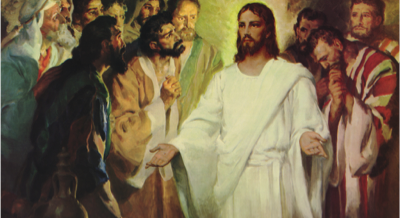
It had been a terrible few days, days that went from triumph to execution, from hope to disaster, from faithfulness to betrayal, from bravado to cowardice; all seemed lost and the doors of the house where the disciples had met were locked for fear of the Jews. If they had executed the leader, why would they not do the same to his followers? Imagine the conversations of the disciples, imagine the feelings they were experiencing – guilt, remorse, fear, maybe even rage – and into all that negativity Jesus appears and says simply, peace be with you. Peace – how could he speak of peace? Give them a good dressing down, that would seem appropriate; an ‘I told you so’, would be right on the mark; but peace, how could they know peace?
They could know peace because peace came to them in the person of the risen Jesus. Peace was not a condition or state to be enjoyed but a person to meet, a person with whom to renew a relationship, and not just renew but experience in a way they could only have dreamed of. Three times Jesus says, peace be with you because Jesus’ only desire is for all people to experience the peace that only he can give. We notice that Jesus does not go on to say that they will have no more troubles, that the enmity that brought death to him will go away, that they will not experience opposition, then or later. It is because of those present and future troubles that Jesus brings them peace, the kind of peace that we can rely on knowing that death has been conquered. The world thought it had eliminated Jesus, the stone that the builders rejected, but instead it enabled him to overcome the final enemy, death itself. And with death conquered, his followers had nothing to fear so long as they were one with him. So it is with us if we place all out trust in Jesus.
A second thing we are aware of is that today is Divine Mercy Sunday, a day on which we are asked to be particularly attentive to the mercy that only God can give, mercy we are invited to receive and share. Just as Jesus forgave his disciples, so we are invited to extend that same forgiveness and mercy to others. Receive the Holy Spirit. If you forgive the sins of any, they are forgiven them; if you retain the sins of any, they are retained. Forgive, be merciful: do not hold grudges, do not try to get even, do not seek revenge; no, forgive, and when you think you have forgiven enough, been overly generous with someone, forgive some more. God’s forgiveness, born of God’s love for us, is a limitless ocean of mercy; remember, we have no reason to be afraid for God loves us beyond measure, and we are called to love beyond measure. It is good for us to remember this, especially in this time of the covid-19 pandemic. Like the disciples, we are sequestered from the world, and from one another, out of fear, fear of this invisible enemy, and Jesus’ invitation is the same for us as it was for his disciples in the day of his resurrection. He invites us to put our trust in him and in his Father, to trust that in his love and mercy God is still there for us and for the world. Naturally, it is incumbent upon us to obey the directions and cautions we receive from the appropriate authorities, but we must also remember that we have a role to play as well. In the first reading we heard how the early Christians devoted themselves to the apostles’ teaching and fellowship, to the breaking of bread and the prayers. It is true that we are not able to gather to celebrate the breaking of bread, but we can attend to the Apostles’ teaching by sending time with the scriptures; we can enjoy fellowship by using the various technologies to be in support one another. And we can most certainly pray with confidence that using the gifts God has given them, researchers will find an antidote. We can put this in God’s hands, confident that this is not God’s wish for us, but it is God’s desire that we trust in his divine mercy to free us from the pestilence of death. So for today, two things: first, this afternoon at three o’clock, the hour of Divine Mercy, pray the Divine Mercy Chaplet or some other prayer that celebrates God’s mercy, and secondly, as our part in contributing to the relief from the virus, adopt one act of fasting to observe until this has passed. Prayer and fasting, these are our weapons against this evil.
Fr. Charlie Broderick
APR
2020

About the Author: